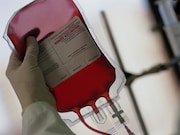Intraoperative autologous donation strategy leads to improved outcomes
TUESDAY, Jan. 29, 2019 (HealthDay News) — Blood conservation via intraoperative autologous donation (IAD) is safe and effective in reducing transfusions during cardiac surgery, according to research presented at the annual meeting of The Society of Thoracic Surgeons, held from Jan. 27 to 29 in San Diego.
Eric Zimmerman, M.D., from the Oregon Health & Science University in Portland, and colleagues retrospectively reviewed a cardiac surgery database from January 2009 to December 2017 to compare outcomes before (268 patients) and after (420 patients) departmental implementation (January 2013) of a more aggressive IAD protocol.
The researchers found that compared with the preimplementation period, heart surgeries in the postimplementation period were characterized by a reduced need for postoperative blood transfusion (70 versus 40 percent), fewer total transfusions (1.76 versus 0.79 packed red blood cell transfusions), lower chest tube output (1,295 versus 1,207 mL), and shorter length of stay (7.8 versus 6.8 days).
“I believe that blood conservation may offer significant savings in terms of morbidity and mortality,” Zimmerman said in a statement. “Importantly, these savings have implications for quality of life after heart surgery and also may translate to cost efficiencies for hospitals and care providers.”
Copyright © 2019 HealthDay. All rights reserved.








